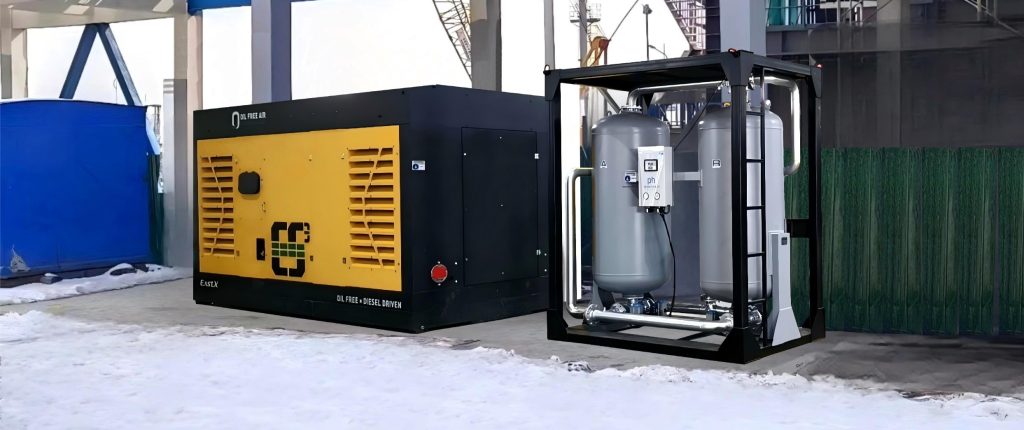The ideal operating temperature for most air compressors ranges between 4°C and 35°C. In winter, temperatures outside this range—especially below freezing—can significantly impact the performance and safety of compressed air systems, particularly when the compressor room is not properly insulated or heated.
1. Effects of Cold Temperatures on Air Compressors
Sudden winter cold snaps can cause both short-term disruptions and long-term damage. Frozen condensate is especially dangerous, as it may block or rupture critical components like control lines, discharge valves, air filters, and heat exchangers. Additional common risks include:
- Compressor Fails to Start
Many rotary screw compressors come equipped with low ambient temperature limit switches that prevent startup if the temperature drops below 4°C. - Compressor Oil Becomes Too Thick
Cold temperatures increase oil viscosity, reducing its ability to lubricate and causing higher power demand during startup. Prolonged exposure to this condition may shorten motor lifespan. - Overcooling in Refrigerated Air Dryers
In winter, refrigerated dryers may work excessively. If removed moisture freezes inside the system, it can damage internal components. - Reduced Dryer Efficiency
Moisture may freeze within the dryer’s piping, causing valve malfunctions and silencer blockages, which lead to decreased purge flow and overall efficiency. - Component Corrosion
As dryer efficiency drops in colder environments, moisture can accumulate throughout the system. Long-term exposure promotes rust and internal corrosion.
2. How to Protect Air Compressors in Cold Weather
To ensure continued and safe operation during winter months, consider the following best practices:
- Drain Condensate Regularly
Condensate collects in low points of the system, such as air receiver tanks. Frozen water can rupture pipes. Check tanks several times a week and drain even small accumulations. Installing an automatic drain valve is a simple yet highly effective solution. - Insulate External Piping and Drains
Apply heat tape or thermal insulation to exposed drain lines if outdoor temperatures are expected to fall below freezing. - Monitor for Frozen Water and Oil
Sub-zero conditions can cause oil to solidify, leading to poor lubrication and potential machine failure. Keep oil temperatures within the recommended range. - Keep Compressors Warm
If the compressor is installed in an unheated area, use a space heater to maintain a stable ambient temperature inside the compressor room or enclosure.
Proper winterization of air compressor systems is essential to preventing operational issues, equipment damage, and unexpected downtime. A small investment in winter protection today can save significant maintenance costs tomorrow.


